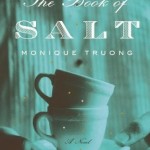The Shaughnessy Cohen Prize for Political Writing was established in honour of the outspoken and popular Member of Parliament from Windsor, Ontario, who died on December 9, 1998.
Now in its fourteenth year, the prize is awarded annually for a book of literary nonfiction that captures a political subject of relevance to Canadian readers and has the potential to shape or influence thinking on Canadian political life. The winning work combines compelling new insights with depth of research and is of significant literary merit.
In the running for this year’s prize are the following worthy contenders:
Happy City: transforming our lives through urban design (M) by Charles Montgomery
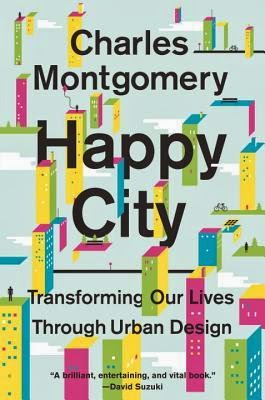 “Happy City will revolutionize the way we think about urban life. After decades of unchecked sprawl, more people than ever are moving back to the city. Dense urban living has been prescribed as a panacea for the environmental and resource crises of our time. But is it better or worse for our happiness? Are subways, sidewalks and condo towers an improvement on the car-dependence of sprawl? The award-winning journalist Charles Montgomery finds answers to such questions at the intersection between urban design and the emerging science of happiness, during an exhilarating journey through some of the world’s most dynamic cities. Rich with new insights from psychology, neuroscience and Montgomery’s own urban experiments, Happy City reveals how our cities can shape our thoughts as well as our behavior. The message is as surprising as it is hopeful: by retrofitting cities and our own lives for happiness, we can tackle the urgent challenges of our age. The happy city can save the world–and all of us can help build it.” – publisher
“Happy City will revolutionize the way we think about urban life. After decades of unchecked sprawl, more people than ever are moving back to the city. Dense urban living has been prescribed as a panacea for the environmental and resource crises of our time. But is it better or worse for our happiness? Are subways, sidewalks and condo towers an improvement on the car-dependence of sprawl? The award-winning journalist Charles Montgomery finds answers to such questions at the intersection between urban design and the emerging science of happiness, during an exhilarating journey through some of the world’s most dynamic cities. Rich with new insights from psychology, neuroscience and Montgomery’s own urban experiments, Happy City reveals how our cities can shape our thoughts as well as our behavior. The message is as surprising as it is hopeful: by retrofitting cities and our own lives for happiness, we can tackle the urgent challenges of our age. The happy city can save the world–and all of us can help build it.” – publisher
Whatever Happened to the Music Teacher? how Government decides and why (M)
by Donald J. Savoie
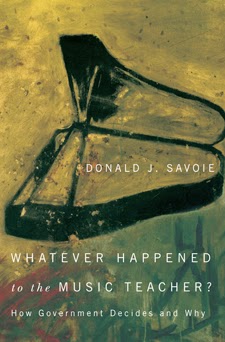 “Thirty years ago, Anglo-American politicians set out to make the public sector look like the private sector. These reforms continue today, ultimately seeking to empower elected officials to shape policies and pushing public servants to manage operations in the same manner as their private-sector counterparts. In Whatever Happened to the Music Teacher?, Donald Savoie provides a nuanced account of how the Canadian federal government makes decisions. Savoie argues that the traditional role of public servants advising governments on policy has been turned on its head, and that evidence-based policy making is no longer valued as it once was. Policy making has become a matter of opinion, Google searches, focus groups, and public opinion surveys, where a well-connected lobbyist can provide any answers politicians wish to hear….” – publisher
“Thirty years ago, Anglo-American politicians set out to make the public sector look like the private sector. These reforms continue today, ultimately seeking to empower elected officials to shape policies and pushing public servants to manage operations in the same manner as their private-sector counterparts. In Whatever Happened to the Music Teacher?, Donald Savoie provides a nuanced account of how the Canadian federal government makes decisions. Savoie argues that the traditional role of public servants advising governments on policy has been turned on its head, and that evidence-based policy making is no longer valued as it once was. Policy making has become a matter of opinion, Google searches, focus groups, and public opinion surveys, where a well-connected lobbyist can provide any answers politicians wish to hear….” – publisher
The Longer I’m Prime Minister: Stephen Harper and Canada, 2006 – (M) by Paul Wells
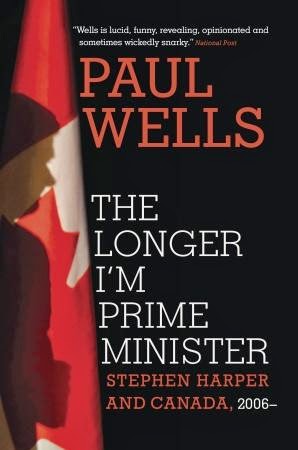 “The definitive portrait of Stephen Harper in power by this country’s most trenchant, influential and surprising political commentator. Despite a constant barrage of outrage and disbelief from his detractors, Stephen Harper is on his way to becoming one of Canada’s most significant prime ministers. He has already been in power longer than Lester B. Pearson and John Diefenbaker. By 2015, and the end of this majority term, he’ll have caught up to Brian Mulroney. No matter the ups and downs, the triumphs and the self-inflicted wounds, Harper has been moving to build the Canada he wants–the Canada a significant proportion of Canadian voters want or they wouldn’t have elected him three times.
“The definitive portrait of Stephen Harper in power by this country’s most trenchant, influential and surprising political commentator. Despite a constant barrage of outrage and disbelief from his detractors, Stephen Harper is on his way to becoming one of Canada’s most significant prime ministers. He has already been in power longer than Lester B. Pearson and John Diefenbaker. By 2015, and the end of this majority term, he’ll have caught up to Brian Mulroney. No matter the ups and downs, the triumphs and the self-inflicted wounds, Harper has been moving to build the Canada he wants–the Canada a significant proportion of Canadian voters want or they wouldn’t have elected him three times.
Paul Wells explores just what Harper’s understanding of Canada is, and who he speaks for in the national conversation. He explains Harper not only to Harper supporters but also to readers who can’t believe he is still Canada’s prime minister. Paul Wells is the political editor of Maclean’s magazine. His previous book, Right Side Up: The Fall of Paul Martin and the Rise of Stephen Harper’s New Conservatism, was a national bestseller and his blog, Inkless Wells, is a must-read among Canadians who follow politics” – publisher
The Dogs are Eating Them Now: our war in Afghanistan (M)
by Graeme Smith
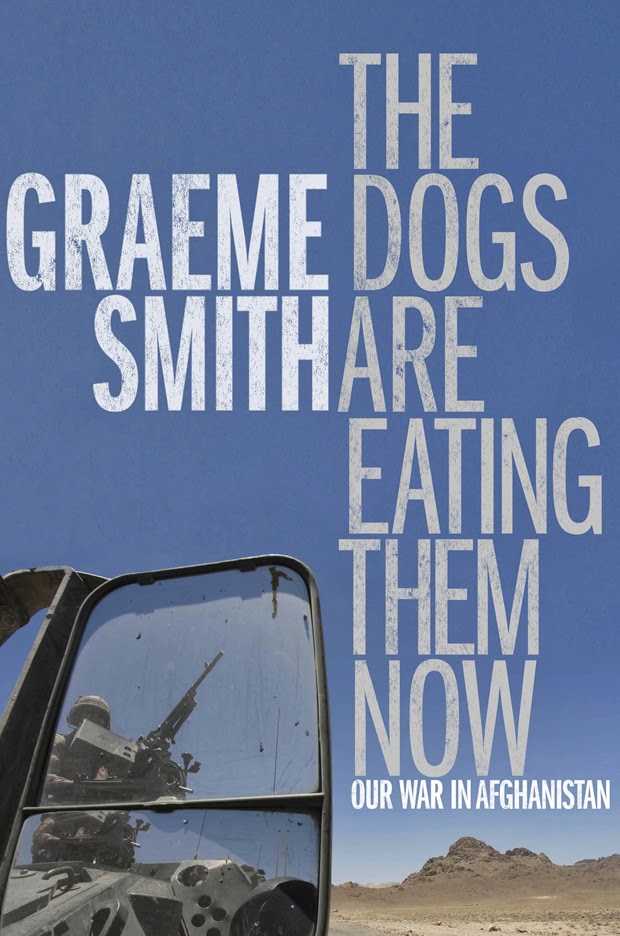 “A highly personal narrative of our war in Afghanistan and how it went dangerously wrong. Written by a former foreign correspondent, this is a gripping account of modern warfare that takes you into back alleys, cockpits and prisons. From the corruption of law enforcement agents and the tribal nature of the local power structure to the economics of the drug trade and the frequent blunders of foreign troops, this is the no-holds-barred story from a leading expert on the insurgency. A bold and candid look at the Taliban’s continued influence–and at the mistakes, catastrophes and ultimate failure of the West’s best intentions.” – publisher
“A highly personal narrative of our war in Afghanistan and how it went dangerously wrong. Written by a former foreign correspondent, this is a gripping account of modern warfare that takes you into back alleys, cockpits and prisons. From the corruption of law enforcement agents and the tribal nature of the local power structure to the economics of the drug trade and the frequent blunders of foreign troops, this is the no-holds-barred story from a leading expert on the insurgency. A bold and candid look at the Taliban’s continued influence–and at the mistakes, catastrophes and ultimate failure of the West’s best intentions.” – publisher
The War That Ended Peace: the road to 1914 (M)
by Margaret MacMillan
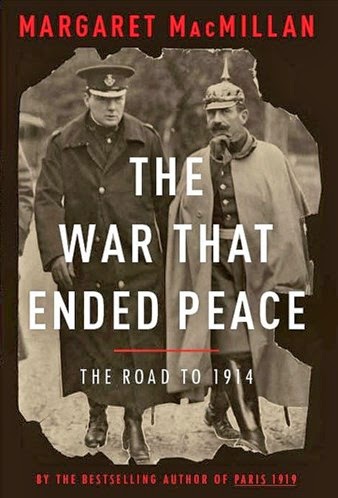 “The First World War followed a period of sustained peace in Europe during which people talked with confidence of prosperity, progress, and hope. But in 1914, Europe walked into a catastrophic conflict that killed millions, bled its economies dry, shook empires and societies to pieces, and fatally undermined Europe’s dominance of the world. It was a war that could have been avoided up to the last moment–so why did it happen? Beginning in the early nineteenth century and ending with the assassination of Archduke Franz Ferdinand, award-winning historian Margaret Macmillan uncovers the huge political and technological changes, national decisions, and just as important, the small moments of human muddle and weakness that led Europe from peace to disaster. This masterful exploration of how Europe chose its path towards war will change and enrich how we see this defining moment in history” – publisher
“The First World War followed a period of sustained peace in Europe during which people talked with confidence of prosperity, progress, and hope. But in 1914, Europe walked into a catastrophic conflict that killed millions, bled its economies dry, shook empires and societies to pieces, and fatally undermined Europe’s dominance of the world. It was a war that could have been avoided up to the last moment–so why did it happen? Beginning in the early nineteenth century and ending with the assassination of Archduke Franz Ferdinand, award-winning historian Margaret Macmillan uncovers the huge political and technological changes, national decisions, and just as important, the small moments of human muddle and weakness that led Europe from peace to disaster. This masterful exploration of how Europe chose its path towards war will change and enrich how we see this defining moment in history” – publisher
Shaughnessy Cohen Prize for Political Writing
Winner: $25,000; Finalists: $2,500
Sponsored by


